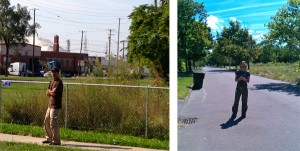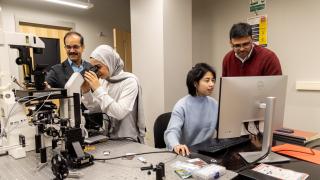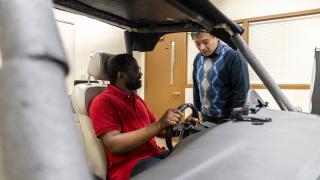 Paul Draus, associate professor of sociology, and Julie Roddy, associate professor of public policy, take to the streets in Detroit to talk with street workers.
Paul Draus, associate professor of sociology, and Julie Roddy, associate professor of public policy, take to the streets in Detroit to talk with street workers.
Some label them prostitutes, while others refer to them as street workers. Regardless of their title, these women make up a good chunk of the docket at Detroit’s drug treatment court.
While investigating the Detroit Health and Wellness Promotion’s Fresh Start Program, two University of Michigan-Dearborn faculty members wanted to learn more about the lives of women engaged in street sex work and active substance abuse. They also were interested in how these women adapted and changed throughout the treatment and recovery process.
Julie Roddy, associate professor of public policy, and Paul Draus, associate professor of sociology, conducted nearly 100 interviews with Detroit prostitutes over the past couple years to determine what social factors impacted their lifestyle.
Roddy and Draus worked closely with local law enforcement agencies, which included several ride-alongs in which the UM-Dearborn professors observed from patrol vehicles as police searched for street workers.
Once they established ties with law enforcement and community agencies, Roddy and Draus spoke directly with prostitutes at various stages. Some women were jailed after recent arrests. Others were in residential treatment to break their drug addiction and find a new profession. And a few had left the voluntary treatment program and returned to the streets.
In one of those interviews, a former prostitute was asked what life was like as a street worker.
“It was hell, pure hell,” the woman said.
She used crack cocaine and heroin throughout the day – actions that she said led to a “completely useless life.”
At the same time, many women agreed that street sex work represented the best choice among bad alternatives. Each of them faced limited economic opportunities, though many believed prostitution helped them maximize their options.
Roddy and Draus also asked women how they got involved in prostitution. One woman admitted she got involved because her boyfriend left Michigan, which left her with no money to buy food or pay the bills.
“I realized how easy it was to make money,” she said.
Through their research, Roddy and Draus also discovered how certain neighborhoods catered to street workers, while others disallowed such illegal activity.
“Both street prostitution and the local drug economy are deeply structured by the social, moral and legal practices of the larger society, which explicitly allows for the presence of bars, strip clubs, motel and rooming houses within particular geographic zones,” according to a paper based on their study.
Their research has an undeniable impact on the quality of life in the metropolitan region, said Martin Hershock, College of Arts, Sciences, and Letters dean.
“Julie’s and Paul’s work highlights the lives and experiences of some of our region’s most vulnerable residents and offers the promise of better informing decision makers and public health officials, as they work to rehabilitate these women and empower them to move their lives in a more positive direction,” Hershock said.
Their research was presented in August at an American Sociological Association conference in New York.





